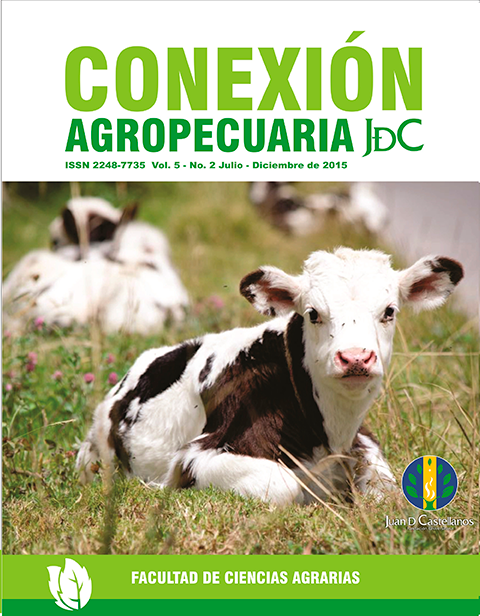AVALIAÇÃO DOS PARÂMETROS PRODUTIVOS DE FRANGO COM A INCLUSÃO DE TOMILO (Thymus-vulgaris L.) NA DIETA
Palavras-chave:
Alimentação, Conversão alimentar, Eficiência alimentar, Ganho de pesoResumo
O tomilho (Thymus-vulgaris L.) é uma planta da família Labiatae que, além de ser utilizada como meio para preservar e melhorar o sabor dos alimentos, é utilizado como inibidor de fungos e bactérias patogênicas, a fim de melhorar a eficiência do trato digestivo, considerando esta planta como uma boa alternativa na alimentação animal para melhorar o desempenho produtivo. Por isso, o objetivo do estudo foi avaliar a inclusão de Thymus vulgaris L. nos parâmetros produtivos de frangos de corte. Para tanto, foi conduzido um experimento em uma fazenda localizada em Villa de Leyva (Boyacá), por um período de 42 dias, sendo utilizados 120 pintos machos da linhagem Cobb, divididos em delineamento inteiramente casualizado, com três tratamentos, cinco repetições. e oito aves por repetição. O tratamento 1 (T1) foi determinado como controle e sua alimentação de base foi uma ração comercial balanceada; tratamento 2 (T2) e três (T3), aos alimentos balanceados foram adicionados 3% e 5% de tomilho seco e 5%, respectivamente. Os dados de ganho de peso diário, conversão alimentar e eficiência nutricional foram avaliados por Anova e as diferenças estatísticas entre os tratamentos pelo teste de Tukey, com nível de significância de 5%. Como resultado, não foram encontradas diferenças estatisticamente significantes entre os tratamentos (p> 0,05) para ganho de peso e peso final. No entanto, o tratamento com T3, com eficiência de 0,35 e conversão alimentar de 2,54, apresentou o melhor desempenho em relação a T1 e T2. Ficou evidenciado que o desempenho produtivo em termos de ganho de peso das aves, não é afetado pela inclusão do tomilho desidratado na dieta dos animais.
Biografia do Autor
Clariza Bautista Franco, Fundación Universitaria Juan de Castellanos
Ingeniera Agropecuaria
Yesid Orlando González Torres, Fundación Universitaria Juan de Castellanos
Olga Lucía Torres Neira, Fundación Universitaria Juan de Castellanos
Referências
ADAM, K., SIVROPOULOU, A., KOKKINI, S., LANARAS, T., & ARSENAKIS, M. 1998. Antifungal activities of Origanum vulgare ssp. Hirtum, Menthaspicata, Lavandula angustifolia, and Salvia fruticosa essential oils against human patho- genic fungi. Journal of Agricultural and Food Chemistry (46): 1739-1745.
AFSHAR-OROMIEH, A., HABERKORN, U., EDER, M., EISENHUT, M., & ZECHMANN, C. M. (2012). [68 Ga] Gallium-labelled PSMA ligand as superior PET tracer for the diagnosis of prostate cancer: comparison with 18 F-FECH. European journal of nuclear medicine and molecular imaging, 39 (6): 1085-1086.
AL-SHAMI, M. A., SALIH, M. E., & ABBAS, T. E. 2011. Effects of dietary inclusion of alfalfa (Medicago sativa) leaf meal and Xylan enzyme on laying hens' performance and egg quality. Res. Opin. Anim. Vet. Sci. 2 (1): 14-18.
AMAD, A. A., MÄNNER, K., WENDLER, K. R., NEUMANN, K., & ZENTEK, J. 2011. Effects of a phytogenic feed additive on growth performance and ileal nutrient digestibility in broiler chickens. Poultry Science 90 (12): 2811-2816.
AMAD, A. A., WENDLER, K. R., & ZENTEK, J. 2013. Effects of a phytogenic feed additive on growth performance, selected blood criteria and jejunal morphology in broiler chickens. Emirates Journal of Food and Agriculture 25 (7): 549-554.
BARTON, M.D. 2000. Antibiotic use in animal feed and its impact on human health. Nutrition Research Reviews 13 (2): 279-299.
BÖLÜKBAŞI, Ş. C., & ERHAN, M. K. (2007). Effect of Dietary Thyme (Thymus vulgaris) on Laying Hens Performance and Escherichia coli (E. coli) Concentration in Feces. International Journal of Natural & Engineering Sciences 1(2): 55-58.
BRENES, A., & ROURA, E. (2010). Essential oils in poultry nutrition: Main effects and modes of action. Animal Feed Science and Technology 158 (1): 1-14. CALISLAR, S., GEMCI, I., & KAMALAK, A. 2009. Effects of Orego-Stim® on broiler chick performance and some blood parameters. J. Anim. Vet. Adv. 8: 2617-2620.
CASTILLEJOS, L., CALSAMIGLIA, S., & FERRET, A. 2006. Effect of essential oil active compounds on rumen microbial fermentation and nutrient flow in in vitro systems. Journal of Dairy Science 89 (7): 2649-2658.
CIFTCI, M., GULER, T., SİMSEK, U. G., ERTAS, O. N., DALKILIC, B., & BICER, Z. 2009. The effect of Thymus vulgaris L. oil as growth promoter in broilers. Indian Veterinary Journal 86 (9): 930-932.
CASTRO, M. 2005. Uso de aditivos en la alimentación de monogástricos. Revista Cubana de Ciencia Agrícola 39: 451-457.
CARRIÓN, C., & PAÚL, F. (2013). Evaluación de tres niveles de aceite de orégano (regano 500) como promotor de crecimiento en la producción de pollos parrilleros en el cantón Loja (Bachelor's thesis).
CHIKHOUNE, A., STOUVENEL, L., IGUER-OUADA, M., HAZZIT, M., SCHMITT, A., LORÈS, P., WOLF, J.P., AISSAT, K., AUGER, J., VAIMAN, D. & TOURÉ, A. 2015. In-vitro effects of Thymus munbyanus essential oil and thymol on human sperm motility and function. Reproductive biomedicine online 31 (3): 411-420.
FALCÃO-E-CUNHA, L., CASTROS OLLA, L., MAERTENS, L., MARUUNEK, M., PINHEIRO, V., FREIRE, J., & MOURÃO, J.L. 2007. Alternatives to antibiotic growth promoters in rabbit feeding: a review. World Rabbit Science (15): 127-140.
HARO GONZÁLEZ, M. D. P. D. (2015). Efecto de los aceites esenciales de plantas aromático-medicinales en la fase de transición de animales monogástricos.
HERNÁNDEZ, F., MADRID, J., GARCÍA, V., ORENGO, J., & MEGIAS, M.D. 2004. Influence of Two Plant Extracts on Broilers Performance, Digestibility, and Digestive Organ Size. Poultry Science (83): 169-174.
HASELMEYER, A., ZENTEK, J., & CHIZZOLA, R. 2015. Effects of thyme as a feed additive in broiler chickens on thymol in gut contents, blood plasma, liver and muscle. Journal of the Science of Food and Agriculture 95(3): 504-508.
HOFFMAN-PENNESI, D., & WU, C. 2010. The effect of thymol and thyme oilfee d supplementation on growth performance, serum antioxidant levels, and cecal Salmonella population in broilers. J. Appl. Poult. Res. 19: 432-443.
KALANTAR, M., REZAEI, M., SALARY, J., & HEMATI- MATIN, H. R. 2014. Thymus vulgaris L., Glycyrrhiza glabra or Combo® enzyme in corn vs. barley-based broiler diets. Journal of Coastal Life Medicine 2 (12): 993-997.
LARA, P. E., ITZÁ-ORTIZ, M. F., AGULIAR, U.E., & SANGINÉS, G.J.R. 2010. Harina de hojas de plantas aromáticas como promotores del crecimiento en pollos de engorda. Pesq. agropec. bras. 45 (3): 294-298.
LEE, K. W., EVERTS, H., KAPPERT, H. J, YEOM, K. H., & BEYNEN, A. C. 2003. Dietary carvacrol lowers body weight gain but improves feed conversion in female broiler chickens. The Journal of Applied Poultry Research 12 (4): 394-399.
LANGHOUT, P. 2005. Alternativas ao uso de quimioterápicos na dieta de aves: a visão da indústria e recentes avanços. In: Conferência Apinco de Ciência e Tecnologia Avícolas, Santos, SP. Anais. Santos: Apinco 22: 21-33.
LEITE, P.R., RODRÍGUEZ, M.F., RODRIGUESL, P.M., D'AVILA, H.J., & RIBEIRO, L. M. J. 2012. Aditivos fitogênicos em rações de frangos. Enciclopédia Biosfera, Centro Científico Conhecer, Goiânia, 8 (15): 9.
MCPHEE, C. S., ANDERSON, K. L., YEATTS, J. L., MASON, S. E., BARLOW, B. M., & BAYNES, R. E. (2011). Hot topic: Milk and plasma disposition of thymol following intramammary administration of a phytoceutical mastitis treatment. Journal of dairy science 94 (4): 1738-1743.
MURCIA, J., & HOYOS, I. 2003. Características y aplicaciones de las plantas. Disponible en: http://www.zonaverde.net/origanumvulgare.htm. Accesado en: 06/12/2015.
OCAK, N., ERENER, G., BURAK AK, F., SUNGU, M., ALTOP, A., & OZMEN, A. 2008. Performance of broilers fed diets supplemented with dry peppermint (Mentha piperita L.) or thyme (Thymus vulgaris L.) leaves as growth promoter source. Czech Journal of Animal Science 53 (4): 169-175.
RAHIMI, S., TEYMORI ZADEH, Z., TORSHIZI, K., OMIDBAIGI, R., & ROKNI, H. (2011). Effect of the three herbal extracts on growth performance, immune system, blood factors and intestinal selected bacterial population in broiler chickens. Journal of Agricultural Science and Technology 13: 527-539.
SAKI, A.A., KALANTAR, M., & KHORAMABADI, V. 2014. Effects of Drinking Thyme Essence (Thymus vulgaris L.) on Growth Performance, Immune Response and Intestinal Selected Bacterial Population in Broiler Chickens. Poultry Science Journal 2 (2): 113-123.
SANTURIO, J. M., SANTURIO, D. F., POZZATI, P., MORAES, C., FRANCHIN, P. R., & ALVES, S. H. 2007. Atividade antimicrobiana dos óleos essenciais de orégano, tomilho e canela frente a sorovares de Salmonella entérica de origem avícola. Ciência Rural 37 (3): 803-808.
SOURI, H., KHATIBJOO, A., TAHERPOOR, K., HASSAN ABADI, A., FATTAHNIA, F., & ASKARI, M. 2015. Effect of Thymus vulgaris and Satureja khuzestanica ethanolic extracts on broiler chickens' performance and immune response. Iranian Journal of Applied Animal Science 5 (2): 437-446.
TOGHYANI, M., TOHIDI, M., GHEISARI, A. A., & TABEIDIAN, S. A. 2010. Performance, immunity, serum biochemical and hematological parameters in broiler chicks fed dietary thyme as alternative for an antibiotic growth promoter. African Journalof Biotechnology 9 (40): 6819-6825.
SI, W., NI, X., GONG, J., YU, H., TSAO, R., HAN, Y., & CHAMBERS, J. R. 2009. Antimicrobial activity of essential oils and structurally related synthetic food additives towards Clostridium perfringens. Journal of applied microbiology 106 (1): 213-220.
WINDISCH, W., SCHEDLE, K, PLITZNER, C., & KROISMAYR, A. 2007. Use of phytogenic products as feed additives for swine and poultry. Journal of Animal Science 86 (14): E140-E148.




